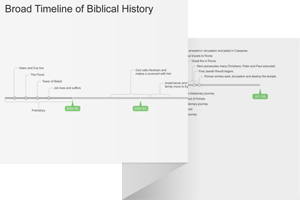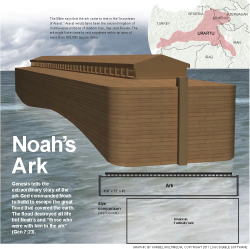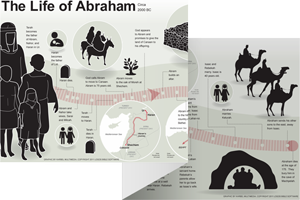The Future of Bible Study Is Here.
 Loading…
Loading…
You have not started any reading plans.
- More »
Sign in or register for a free account to set your preferred Bible and rate books.
1:1–9:44 The books of 1 and 2 Chronicles First Chronicles begins that history with a lengthy genealogy In the ancient world, lineage or pedigree was closely connected to prestige, status, and identity. Many extrabiblical texts reflect a similar concern for tracing the ancestry of contemporary people back to a prominent person (e.g., Homer, Iliad 20.215–40; Herodotus, Histories 2.143; the Behistun Inscription).
|
1:1 Adam The Chronicler uses the format of a genealogy starting with Adam to review the story of the ot from Genesis to the postexilic period of Ezra and Nehemiah. The people listed in vv. 1–4 are mentioned in more detail in the genealogy of Gen 5.
1:4 Noah The man God saved from the flood,
God saved from the flood, along with his sons and their families. See Gen 6–9.
along with his sons and their families. See Gen 6–9.
1:5–23 This list is based closely on the Table of Nations in Gen 10. The Table of Nations divides up the known world according to its descent from the sons of Noah. See note on Gen 10:1–32. |
 Understanding the Table of Nations
Understanding the Table of Nations
1:7 Rhodanim The same as “Dodanim” in Gen 10:4. The Hebrew letters for “d” and “r” are very similar (see note on Gen 10:4).
letters for “d” and “r” are very similar (see note on Gen 10:4).
1:19 in his days the earth was divided The name “Peleg” comes from the Hebrew word palag, meaning “to divide.”
1:24–27 This list of the descendants of Shem includes the names, but not the details, from the genealogy in Gen 11:10–26 (see note on Gen 11:10–26). |
1:27 Abram, that is, Abraham “Abram” means “exalted father” while “Abraham” means “father of many.” God changed his name from “Abram” to “Abraham” after making a covenant with him (see Gen 17:5 and note).
means “father of many.” God changed his name from “Abram” to “Abraham” after making a covenant with him (see Gen 17:5 and note).
There are several instances of names being changed in the ot. Sometimes these changes are made by people to reflect a changing situation. Naomi, after losing her husband and sons, changes her name from Naomi, meaning “pleasant,” to Mara, meaning “bitter” (see Ruth 1:20 and note). Often, however, God makes the change Himself. He changed Abraham’s wife’s name from Sarai to Sarah (see Gen 17:15 and note). He also changed Jacob’s name to Israel (see Gen 32:28 and note). These new names are typically related to recent events. Abram is changed to Abraham after God promises that Abraham will be the father of a multitude. Jacob is changed to Israel, which means either “he strives with God” or “God strives,” after wrestling with God.
 Name DBI
Name DBI
1:28–42 While the Genesis narrative emphasizes the sons who inherited God’s promise to Abraham, Isaac |
1:29 Ishmael Abraham’s son by Hagar, Sarah’s servant. Since Sarah had not borne any children, she offered her servant to Abraham as an alternate means for him to gain a son and heir (Gen 16:1–4). After Isaac was born, Sarah insisted that Hagar and Ishmael be sent away (Gen 21:10).
 Solving Sarai’s Barrenness LRC:G1250
Solving Sarai’s Barrenness LRC:G1250
1:32 Keturah Abraham’s third wife or concubine (Gen 25:1). She is not mentioned until after Sarah has died (Gen 23:1–2; 24:67), giving the impression that Abraham took her as a wife after Sarah’s death. Her six sons represent Arab tribes associated with the incense trade in the Arabian desert (Gen 25:1–6).
Abraham may have taken Keturah as a concubine and had children by her prior to Sarah’s death. He would have been 140 when Isaac married, and Gen 24:67 suggests Sarah’s death was still a recent memory at that time. Abraham clearly had doubts that he would have been able to father children at 100 (Gen 17:17), so it seems unlikely that he fathered six more sons 40 years later.
 Keturah LRC:G1250
Keturah LRC:G1250
 Genesis 25:1–6 G:C
Genesis 25:1–6 G:C
1:33 Midian Ancestor of the Midianites and the name of a region in the northwest Arabian peninsula, east of the Gulf of Aqaba and north of the Red Sea. Moses fled to Midian
and the name of a region in the northwest Arabian peninsula, east of the Gulf of Aqaba and north of the Red Sea. Moses fled to Midian when Pharaoh was trying to kill him (see Exod 2:15 and note).
when Pharaoh was trying to kill him (see Exod 2:15 and note).
1:34 Isaac The son God promised to Abraham and Sarah (Gen 17:16; 18:9–15). Isaac also was Abraham’s primary heir (Gen 24:36; compare Gen 25:6). This verse refers to Jacob as “Israel”—the name he was given by God (Gen 32:27–28).
also was Abraham’s primary heir (Gen 24:36; compare Gen 25:6). This verse refers to Jacob as “Israel”—the name he was given by God (Gen 32:27–28).
1:35 Esau Isaac’s oldest son (Gen 25:25); also called “Edom” (Gen 36:8). He is the ancestor of the Edomites. Esau’s younger brother Jacob acquires his blessing and birthright.
Esau’s younger brother Jacob acquires his blessing and birthright.
Subverting the usual favor and prestige of the firstborn is a common pattern in the book of Genesis (e.g., Abel over Cain, Isaac over Ishmael, Joseph over 10 older brothers).
 Promotion of the Younger Son LRC:G1250
Promotion of the Younger Son LRC:G1250
1:38 Seir The region where Esau settled (Gen 32:3) and where the Edomites lived (Deut 2:4). The Horites
(Gen 32:3) and where the Edomites lived (Deut 2:4). The Horites lived in the area before the Edomites (Gen 14:6; Deut 2:12, 22).
lived in the area before the Edomites (Gen 14:6; Deut 2:12, 22).
The names given here in 1 Chr 1:38–42 and in Gen 36:20–30 are not descendants of Esau but of Seir the Horite (Gen 36:20–21). Often Seir and Edom are used synonymously for the same general territory (e.g., Num 24:18).
1:43–54 This passage about the ancient kings of Edom is virtually identical to Gen 36:31–43. The list of kings also follows the similar genealogy of Esau in Gen 36:9–30. See note on Gen 36:31–39. |

|
About Faithlife Study BibleFaithlife Study Bible (FSB) is your guide to the ancient world of the Old and New Testaments, with study notes and articles that draw from a wide range of academic research. FSB helps you learn how to think about interpretation methods and issues so that you can gain a deeper understanding of the text. |
| Copyright |
Copyright 2012 Logos Bible Software. |
| Support Info | fsb |


